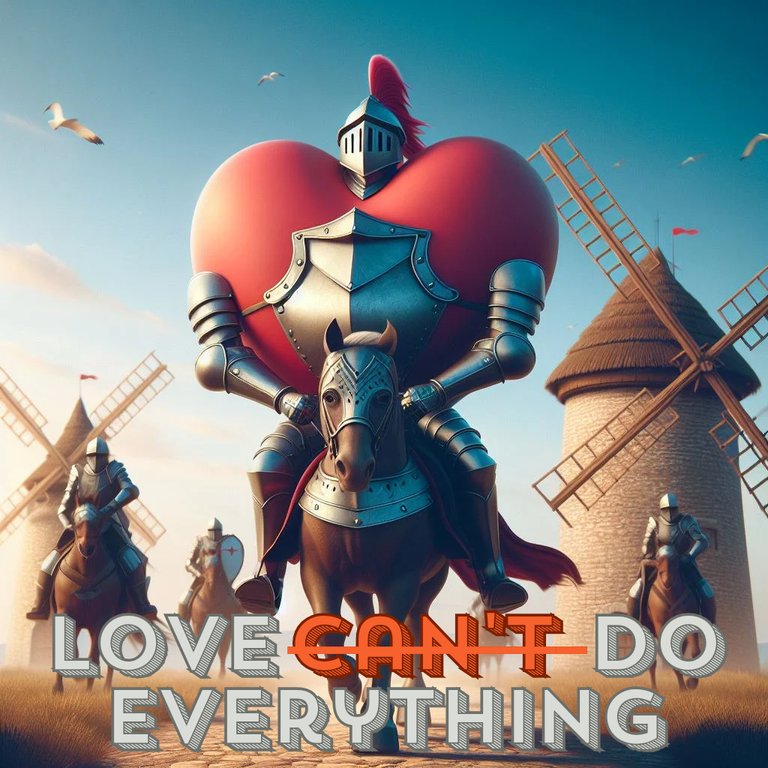
¿Será cierto eso de que el amor lo puede todo? Antes habría que definir qué es el amor, ¿cierto?, lo cual se complica si tomamos en cuenta que no existe «el amor» como tal, sino personas enamoradas. El amor nos lo podemos encontrar definido por aquella idea romántica shakesperiana, o por la idea de completitud de la cual ya he hablado, o por simplemente el compromiso tácito o pactado entre dos partes como si fuese un contrato. Lo cierto es que el amor puede ser muchas cosas en dependencia de nuestras experiencias afectivas, nuestra educación, la cultura o bien puede estar condicionado por nuestras pertenencias a clases sociales, género, edad o raza.
Hablar del amor generalmente es una opinión, porque incluso definirlo teóricamente lo reduce a un coctel de químicos en nuestro organismo, o un conjunto de emociones experimentadas, o una serie de comportamientos estandarizados. En ese sentido, hay una frase que me gusta mucho citar:
«Cuando comprendes que cada opinión es una visión cargada de historia personal, empiezas a darte cuenta de que todo juicio es una confesión».
Es así que el amor es vivenciado por cada uno de nosotros y nosotras de una manera única y diferente, más allá de que partamos de los mismos ideales. De hecho, muchas veces partir de nociones de lo que es el amor que nos venden los medios y la cultura misma sin redefinirlo en función de nuestra propia individualidad, nos lleva directamente a la frustración precisamente por lo que ya decía de que no existe un solo amor para todos y todas.
Entonces, ¿por qué se tiende a asumir que el amor lo puede todo? Pues porque se ha romantizado en exceso la idea del amor hollywoodense; esa idea hegemónica en la que, como sabemos, Disney ha tenido bastante que ver al mostrar modelos afectivos que han caricaturizado y simplificado para que venda. En dichos modelos, el amor queda reducido al enamoramiento, que no es lo mismo, y, si miramos más allá, parten a su vez de modelos coloniales porque quedan enmarcado en lo occidental, heteronormativo, europeo, clase media-alta, lo blanqueado... o sea, que parte de una visión bastante parcializada de lo que es el amor, y que no toma en cuenta las diversas realidades que nos atraviesan según nuestros contextos socioculturales.
Decir que el amor lo puede todo, además, es negar la influencia o la importancia de otras variables que tienen un impacto realmente decisivo en las relaciones de pareja. Si nos referimos al amor romántico como el sentimiento pasional que se experimenta, -que es a lo que generalmente se refieren las personas cuando romantizan al amor-, se nos queda corto porque entonces dónde se deja a la comunicación asertiva, los límites, las diferencias actitudinales, las características personológicas, las influencias contextuales micro y macroestructurales, las distancias, los tiempos, los proyectos futuros, los intereses. Cuando ese amor ignora todo lo anterior está destinado al fracaso.
Cuando amamos, lo hacemos no en el aire, sino en un lugar ya sea físico o digital, a una persona con todo lo que ello implica, y desde un punto de partida que puede ser compartido por esa otra persona o no, pero nunca ajeno a las circunstancias. Por eso es que amar no es suficiente, porque es necesario conciliar una serie de factores que, de no lograrse, en el mejor de los casos traería muchos conflictos dentro del vínculo. Hay que atender a la intersubjetividad, y darnos cuenta de que asumir que el amor es y será suficiente, no es más que una pretensión harto idealista. Aunque amemos con todas nuestras fuerzas, si no existe una adecuada comunicación o intereses en común, si no existe un punto de encuentro, será en vano por mucho empeño que le pongamos.
No se niega que amar sea nuclear en cualquier vínculo sexoafectivo, al contrario, se trata de que el hecho de hacerlo sea redefinido en función de nuestra propia realidad objetiva y subjetiva, y que amar se convierta en un componente que articule al resto de variables para que de como resultado a una relación adecuadamente saludable y funcional que beneficie a los miembros de la misma. En ese sentido, que el amor sea la catapulta, el trampolín para lograr que todo lo demás igualmente importante para la relación, funcione. O sea, el amor como medio y no como estado inamovible.
English version

Is it true that love can do anything? First we would have to define what love is, right, which is complicated if we take into account that there is no such thing as "love" as such, but rather people in love. Love can be defined by that Shakespearean romantic idea, or by the idea of completeness of which I have already spoken, or simply by the tacit or agreed commitment between two parties as if it were a contract. The truth is that love can be many things depending on our affective experiences, our education, culture or it can be conditioned by our belonging to social classes, gender, age or race.
Talking about love is generally an opinion, because even defining it theoretically reduces it to a cocktail of chemicals in our organism, or a set of experienced emotions, or a series of standardized behaviors. In that sense, there is a phrase that I like to quote a lot:
"When you understand that every opinion is a vision loaded with personal history, you begin to realize that every judgment is a confession".
This is how love is experienced by each of us in a unique and different way, even if we start from the same ideals. In fact, many times, starting from notions of what love is sold to us by the media and the culture itself without redefining it according to our own individuality, leads us directly to frustration precisely because of what I have already said, that there is no single love for everyone.
Then, why do we tend to assume that love can do everything? Well, because the idea of Hollywood love has been romanticized to excess; that hegemonic idea in which, as we know, Disney has had a great deal to do by showing affective models that have been caricatured and simplified to sell. In these models, love is reduced to falling in love, which is not the same thing, and, if we look further, they are based on colonial models because they are framed in the Western, heteronormative, European, upper-middle class, whitened... in other words, they are based on a very biased vision of what love is, and do not take into account the different realities that cross us according to our socio-cultural contexts.
To say that love can do everything, moreover, is to deny the influence or importance of other variables that have a truly decisive impact on couple relationships. If we refer to romantic love as the passionate feeling that is experienced, -which is what people generally refer to when they romanticize love-, we fall short because then where do we leave assertive communication, limits, attitudinal differences, personological characteristics, micro and macro-structural contextual influences, distances, times, future projects, interests. When this love ignores all of the above, it is destined to fail.
When we love, we do it not in the air, but in a place whether physical or digital, to a person with all that this implies, and from a starting point that may or may not be shared by that other person, but never alien to the circumstances. That is why loving is not enough, because it is necessary to reconcile a series of factors that, if not achieved, in the best of cases would bring many conflicts within the bond. We must pay attention to intersubjectivity, and realize that assuming that love is and will be enough is nothing more than a very idealistic pretension. Even if we love with all our strength, if there is no adequate communication or common interests, if there is no meeting point, it will be in vain no matter how much effort we put into it.
It is not denied that loving is nuclear in any sex-affective bond, on the contrary, it is about redefining the fact of doing it according to our own objective and subjective reality, and that loving becomes a component that articulates the rest of the variables so that it results in an adequately healthy and functional relationship that benefits the members of the same. In this sense, love should be the catapult, the springboard to make everything else equally important for the relationship work. In other words, love as a means and not as an immovable state.

Créditos | Credits
Imágenes utilizadas | Images used
Todas las imágenes utilizadas son de mi propiedad y fueron generadas utilizando Copilot de Bing y editadas en Canva | All images used are my own property and were generated using Copilot from Bing and were edited using Canva.
Traducción | Translation
Te puede interesar | You may be interested in
El llanto como forma de validarnos | Crying as a way to validate ourselves [ES/EN]
¿Depresión de alto funcionamiento? | High-functioning depression? [ES/EN]
Sigamos hablando del autocuidado | Let's keep talking about self-care [ES/EN]
¿Las media naranjas ruedan? | Does half oranges roll? [ES/EN]
¿Conoces el «porno» de productividad? | Do you know about productivity "porn"? [ES/EN]


Saludos
@tipu curate 4
Upvoted 👌 (Mana: 0/71) Liquid rewards.
Muchas gracias 😊